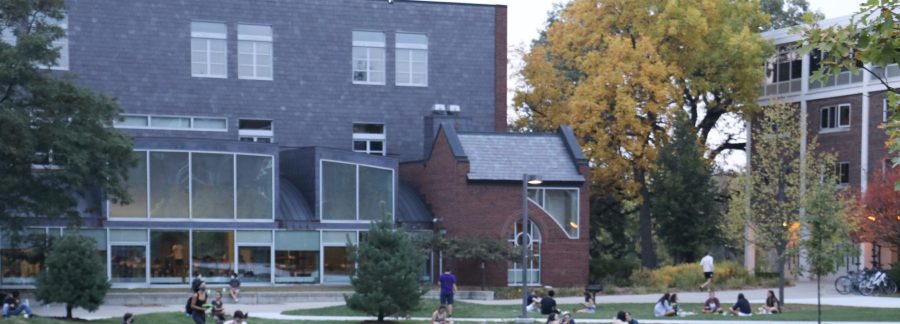A dining services employee tested positive for COVID-19 during the October 23 round of random surveillance testing, sending a number of close contacts “from the work environment” into quarantine, according to an October 28 email from Dean of Students Carolyn Livingston.
A student familiar with the matter said that the incident occurred at Sayles Café and that several student workers were among those quarantined. The positive test also triggered the closure of the Weitz and Schulze Cafés while the college prioritizes staffing the dining halls and Sayles. This is the second time a dining facility has been thrown into chaos because of a positive case among employees.
Eleven student workers at LDC were quarantined during fourth and fifth weeks because they were identified as close contacts of one co-worker. Eric Rasmussen, Bon Appetit’s director of operations, said in an email that they will not be compensated for their lost hours. In response, the students in quarantine expressed frustration over the futility of their social distancing efforts and the added financial burden of a situation they do not feel responsible for causing.
“It feels like a punishment because we were following the rules and this still happened,” said one first-year. “We were wearing our masks, distancing and washing hands.” An anonymous source said that Bon Appetit did not communicate with student workers after their quarantine to tell them about or help them manage the loss in pay. “Missing work,” they continued, is what’s stressing me out the most. Classes can be moved online pretty easily, but this is harder to make up.”
The main reason there were so many contacts associated with one positive case is that the October 9 round of random tests took 80 hours to return from the laboratory instead of the expected 48, according to a campus-wide email from Dean of Students Carolyn Livingston. Carleton conducts a round of 300 random tests every Friday.
The person whose test turned out to be positive then had 80 hours to live life as usual, in addition to the 48 hours prior to testing in which they were considered contagious. They came into close contact with most of their LDC co-workers during those five days.
The stickers on the floor and the intentional spacing of workers behind the food stations are supposed to prevent a situation like this, where a large number of student staff members came into contact on the job. However, one co-worker noted that “it’s not doing what they intend if we all end up in quarantine anyway.” He acknowledged that distancing protocols in the dining hall are inevitably flawed.
“They have the markings on the floor but the line gets bunched up during rush hour. There’s not anything that we can do. When you put that many people in the dining hall that’s just what’s going to happen,” he said.
The issue of proper spacing is clearly present in other dining facilities as well, as evidenced by the news of eight close contacts identified from the case at Sayles, according to data from Carleton’s COVID-19 dashboard.
Rasmussen said that the safety policy will not change for the future. Rather, he said, it is a matter of reminding student workers of the rules for conduct at work. He said, “We have met with the student managers and discussed the importance of distancing, cumulative time in speaking with workers, proper hand washing, mask-wearing, wiping down frequently used spaces and changing out utensils every 20 minutes as we have done from the start. We will be sending a message to all student workers to make sure they understand the importance of distancing and watching out for yourself and those around you.”
Carleton’s official policy on work-related injuries and illnesses states that workers’ compensation insurance is available to students, faculty, and staff “to reimburse medical expenses and to continue wages in the event of occupational illness or accident incurred in the course of employment.” The majority of contacts associated with this case tested negative in the subsequent days. As a result, none have officially reported their quarantine as a work-related illness, though they feel that the college should consider it as one.
For some students, working at LDC is a major part of their financial aid. “I’m losing money that’s supposed to help me afford tuition,” one student said. Bon Appetit said that students in quarantine can make up for their lost hours by covering others’ shifts by the end of the year. While some were heartened by that prospect, others worry about how to make it work with their already busy schedules. “If I cover someone’s shift they’re going to want to take one of mine in return. They don’t want to just give me their hours,” one student in quarantine said. Another added that “most Carleton students tend to keep themselves overly busy, so it seems like a stretch to find six or seven extra shifts to make up for this.”
Students in quarantine have been finding comfort in their common experience. The Carletonian spoke with one person over the phone, who said, “A lot of us ended up not reaching out to find covers for our shifts. There was a kind of pact here where we decided that it shouldn’t be our responsibility to find people because it’s so many shifts, and the situation that brought about the need to find covers was out of our control.”
In the meantime, the students are doing their best to keep up with classes and stave off boredom in quarantine. They added that “at first it felt like a punishment to be in quarantine, when in reality we’re protecting the school by being here. There’s definitely support for that.”
This piece was originally published online on October 25. It was updated on October 31 to include information about the positive case at Sayles, which also appeared in our print edition the day prior.










